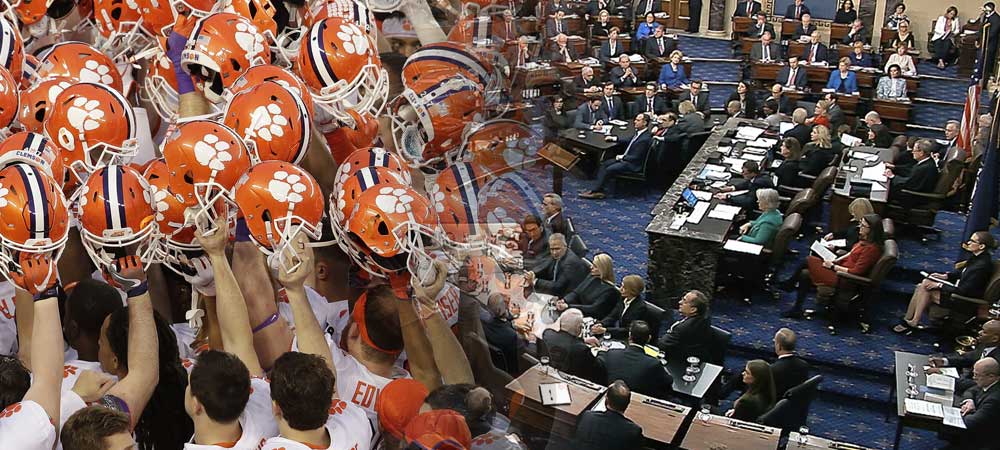- The U.S. Senate is set to hold a hearing on college sports this week discussing both name, image and likeness rights for athletes and the impact of gambling on college sports.
- This hearing could have a massive impact on both the financial structure of college sports and on the legality of college sports betting throughout the country.
- While many universities oppose college sports betting, it may be more prudent to legalize it and provide it with standardized regulations.
WASHINGTON – This Wednesday, the U.S. Senate has a hearing scheduled, titled “Protecting the Integrity of College Athletics.” This hearing will primarily cover two key topics regarding college sports: name, image, and likeness rights for student-athletes, and the impact of gambling on college sports.
Sen. Richard Blumenthal (D-Connecticut) stated on Friday that the hearing would be split into two parts with each issue being discussed separately.
The section on name, image, and likeness rights will have massive implications for the future financial structure of major college athletics, but for most fans, the section on sports betting will have a more tangible impact.
The hearing could lead to universal regulation on college betting. As things are right now, each state is free to pass its own laws regarding legal sports betting. States can also individually determine whether or not to allow college sports betting.
Most states restrict wagers on in-state athletic programs or events, but otherwise do allow sports betting. A handful, including Nevada, place no restrictions on college sports betting. Oregon only allows college sports betting through tribal brick-and-mortar casinos.
Standardizing the rules of college sports betting could certainly streamline the experience for bettors, but there is also a risk that the Senate will simply decide to ban all college sports betting at state-licensed sportsbooks.
Colleges Support Betting Bans
Many universities with major athletics programs support a blanket ban on college sports betting, citing safety concerns for their student-athletes. As with state-licensed sports betting, these universities are all free to apply their own regulations to betting on school athletic competitions.
Purdue University, for example, bans all students, faculty, and staff from betting on Purdue athletic competitions.
Other schools choose to focus on educating students and staff about problem gambling habits rather than enforcing an outright ban on what is, for most people, a harmless form of recreation.
The Case Against Banning College Sports Betting
There are a handful of unfortunate cases of betting on college sports threatening the integrity of the game or even the safety of student-athletes.
During the 1978-79 season, local criminal groups recruited and bribed Boston College basketball players to point shave (purposely not cover the spread).
This year, Louisville University All-American Jordan Nwora said he received a death threat from another student after that student lost a $15 bet on Louisville’s game against the University of Kentucky.
Both these cases are perfect examples of the ugly side of college athletics, but neither one is the product of regulated sports betting.
Neither Massachusetts nor Kentucky offer legal sports betting to residents. Kentucky doesn’t even have any in-state casinos. The bets placed in both cases would have likely been with unregulated bookies.
Legal, regulated sportsbooks can monitor for suspicious betting activity. They also keep extensive betting records, which can help authorities find and prosecute people who choose to threaten student-athletes over their gambling losses.
A ban would likely have little effect on preventing unscrupulous behavior. Fans will bet on the games no matter what the law says, but when betting is legal and regulated, it becomes easier to monitor for such behavior.
No matter what the Senate decides in this week’s hearing, the discussion of legal college sports betting will likely find its way to the Supreme Court eventually.
Advertising Disclosure
In order to provide you with the best independent sports betting news and content LegalSportsBetting.com may receive a commission from partners when you make a purchase through a link on our site.
News tags: 1978-79 point shaving scandal | Boston College | college sports | Congress | Jordan Nwora | Kentucky Wildcats | Louisville Cardinals | Nevada | Oregon | Purdue Boilermakers | Purdue University | Richard Blumenthal | Senate

With a dual background in English and sports performance and business analytics, Carter aims to write stories that both engage and inform the reader. He prides himself on his ability to interweave empirical data and traditional narrative storytelling. When he isn’t keeping readers up to date on the latest sports betting legal news, he’s banging his head against a wall regretting his decision to be a Tampa Bay Buccaneers fan.


 College Football Betting
College Football Betting Best Online Sports Betting
Best Online Sports Betting Best Legal NFL Betting
Best Legal NFL Betting States With Legal Sports Betting
States With Legal Sports Betting Sports Betting Events
Sports Betting Events




